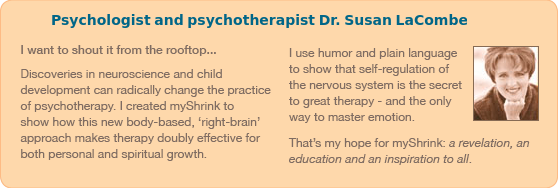I have been clinically depressed two times in my life. In both instances, the depression was obvious. I was physically very tired and moped around for hours; I wasn't excited or happy about anything.
I had a hard time completing even the smallest tasks (watering my plants felt onerous). I felt hopeless and helpless in making any changes to make my life better.
"As a BetterHelp affiliate, we may receive compensation from BetterHelp if you purchase products or services through our link."
Depression and the dorsal vagal state
If you asked me I wouldn't have been able to cite any one reason for feeling depressed.
Oh, for sure my life wasn't going that well . . . but I had been there before and I hadn't felt "depressed".
And here's the interesting part . . . when I recovered from my depressions I wasn't "joyful" either. (This was actually a clue to what was going on with my nervous system.)
But I could function "adequately" in both my work and in my relationships.
Unfortunately, this is where many people get stuck. They end up feeling that this is all there is to life.
They can "function" sufficiently and it's enough to fool everyone that they're fine - including themselves.
Why depression should be taken seriously
The problem with depression that goes untreated or unrecognized is that eventually as the individual recovers sufficiently, it tends to cap any forward movement in their life.
This is where they're apt to be just another "underemployed" worker.
It's where many people "settle" in their lives believing there's no other way to live life.
Faking depression?
You can imagine based on what I'm saying how many people are called 'lazy' when in fact, their moodiness and lack of motivation is actually caused by their depression.
These so called 'character traits' are common depression symptoms.
The sad part is that, depending on how long they've been 'depressed', they're apt to believe it of themselves.
The worst of it is that when you're in this mild to moderate depressed state, your capacity for joy is limited. You just think it's who you are.
For instance, say you're watching a funny TV show. Instead of a having a whole body belly laugh like others around, you're making a "half laugh".
And more times than not, your laugh almost sounds fake. (There's not enough 'let-go' in the nervous system for you to discharge your energy.)
My way out of depression
I continued my work in counseling and at some point I became aware that I was experiencing a low grade depression. So I pursued therapy.
Then with the help of my therapist, I came across an explanation that helped me to understand it more fully.
I now know that I had been chronically in "dorsal".
Among body psychotherapy practitioners when we say someone has gone into "dorsal" we mean the nervous system has gone beyond overwhelm. For instance, you may have at times in your life felt overwhelmed, that you could not take on another thing. Imagine feeling this way all the time.
When this state becomes chronic we believe the nervous system has decelerated into a state called dorsal.
The problem is that this state--as with the potential for all states--it becomes normalized.
That is, the individual becomes so accustomed to the state that it becomes the norm for them. They acclimatize to the flatness of their demeanor.
Sometimes the change in behaviour is noticed but is falsely attributed to getting older!
One friend of mine described it as a ship in calm waters, in the doldrum . . . nothing to look forward to, nothing to pick up her sails.
As the nervous system moves into dorsal it selectively shuts down to conserve energy. In doing so, it becomes restrictive in how much stimulation will be taken in.
In response, the individual, quite unconsciously, gradually moves into a lifestyle that serves to preserve energy. He or she moves into what is referred to as 'living in the minimus'.
This restrictive state is not conscious but it will unknowingly influence the choices we make. I might choose for instance to get a video rather than go to the theatre. Not a big deal once and a while but maybe it now reflects the pattern of how I approach every activity.
"The way you do anything is the way you do everything".
Erika Moore - Massage Therapist RMT
related topics
Scared to Death
The Immobility or Freeze Response
references
Porges, Stephen, (1995). Orienting in a defensive world: Mammalian modification of our eveolutionary heritage. A polyvagal theory. Psychophysiology, 32, 301-318.
Stephen Porges' identified two, not one, branch of the parasympathetic nervous system. His discovery of the dorsal vagal (and its relationship to the ventral vagal) has helped us to understand how the experience of depression develops. The polyvagal theory has also been useful in understanding the mind body connection. You can access his classic 1995 article here (you will be taken off site):
Orienting in a Defensive World...A Polyvagal Theory.
Scaer, Robert, (2005). The Trauma Spectrum: Hidden Wounds and Human Resiliency. New York: W.W. Norton & Company.
A nervous system that has moved into dorsal is not running at its' full potential. The reason being is that much of the energy is being devoted to containing the churned up energy underneath. This leaves less energy for more expansive states like joy and laughter.
Although she does not call it as such, Roz Carroll M.A. of Britain was describing the dorsal state in her well-known Confer lecture series at the Chiron Center in March 2001. Here is an electronic version of her lecture (you will be taken off site):
Autonomic Nervous System: Internal Barometer of Emotional Intensity and Internal Conflict

Reader's Comments

Jill
Therapy, meds & transference, oh my!
I've been dx with cyclothymia, and wonder how this relates. I'm in psychoanalytical psychotherapy twice a week with an analyst, yet I stll cycle, and have come to accept I always will.
Huge transference, paternal, and sometimes can't quit thinking of pleasing him. Migraines upon waking...frustrating dreams. Idk, just interested in this aspect of therapy I know little about.
Thanks for the information.

Shrinklady
Hello Jill, thanks for your comments. It's nice to hear that you have made a commitment to invest in yourself. I know you must feel discouraged with your current results however I have seen folks with this cyclic response make a full recovery.
That said however, changing how your nervous system responds requires a therapist who's attuned to the nuances of your emotions...and someone who helps contain what emotions that arise you.
In my view, this requires face-to-face therapy and one that is less dependent on "talk" and more on the engagement between the client and therapist.
I'm not sure based on the type of therapy that you're receiving whether these conditions are present in your work. You'd be the best judge of that for yourself.
I'll be posting links to a new movie that will help you better understand what's necessary to creating this type of change. If you haven't already done so be sure to see the Inside Job Part 1.
All the best,
Shrinklady

Victoria
Can you be anxious and Dorsal Vagal Depressed at the same time?
Armed with this knowledge, if and when I return to therapy I am going to ask my next therapist about it, because a great deal of this on Dorsal Vagal Depression really does sound as though you could have been writing about me!
Sometimes it feels as though the world has stopped for me, and I am too tired, disenchanted, depressed, hopeless, overwhelmed and generally just Blah to even care about it. Depressed I have been, and for years and years and years. It has now just become a way of life.
Maybe this is what my problem is despite being diagnosed with Acute Anxiety which I have never understood, anxious though I know I can feel at times? Perhaps you van be anxious and Dorsal Vagal Depressed at the same time or perhaps at differing times? I would be interested to know.

Shrinklady
Absolutely Victoria, you can swing into dorsal and out again into an anxious state. That's the biphasic response.
As human beings our states can vary far more than medical diagnostic labels would suggest.
If you're able to track your states, you might notice that after a period of high anxiousness (i.e. after some time dealing with a stressful event or person) you naturally move into dorsal. It's the compensatory reaction of the nervous system.
The good news is that the fact you're feeling anxious suggests that you are not chronically in dorsal. In other words, your anxious state suggests that there's some movement there.
All the best,
Shrinklady

Kristen
What's the difference between dysthymic disorder and 'being in dorsal?
Hi there, What is the difference between being in dorsal and having Dysthymic Disorder?
If someone has "gone into dorsal," is that always some sort of descent from a depression?
From what I know, Dysthymia doesn't always involve an episode of major depression, so I'm wondering if that's the difference.
Thanks a ton! This is a very interesting topic.

Shrinklady
Hi Kristen, yes I find it interesting as well. And yes, it is very likely that the dorsal state is the underlying cause of dysthymia. The problem is that diagnostic labels were often coined without knowledge of the inner workings of the nervous system as we understand it today.
Diagnostic conditions were arrived at through a different process and at a time when we were simply trying to create some order in how clients were presenting. Briefly stated, diagnostic terms (e.g. as used in the DSM IV) were created from the work of experienced clinicians (mainly psychiatrists) who formally agreed (in committees and later, in clinical trials) that a collection of symptoms were related.
They agreed they were related, in part, because they saw these same symptoms over and over again in their patients. And these diagnostic labels provided a way of describing client sypmtoms more succinctly for for research purposes and case consultations.
However, there was no scientific explanation to back up why these symptoms were related other than to cite that medications appear to have a similar effect. (Which is often misinterpreted as causal. In other words, it's like saying by giving water to people with a fever and noticing an amelioration of symptoms: "they must have been suffering from a lack of water.")
On the other hand, basic science underlies our understanding of the dorsal state.
In my view, depression is a chronic state of dorsal. Dysthymia is less chronic and has the characteristics described in Victoria's post. The dorsal state appears to vary along a continuum of "more or less".
How the dorsal state relates to medical diagnostic label will only be confirmed by future research...although personally speaking, I think there are better uses for our research dollars.
In any case, as a body psychotherapist, I work the same way with clients whether they are suffering from depression or dysthymia. I work to bring the nervous system back into regulation.
Thanks for raising the subject Kristen...gave me a chance to air my views!
Shrinklady
P.S. In the article, The Medical Model Connundrum I describe some of the drawbacks of our use of diagnostic labels.

Nancy
Going to therapy is never selfish.
I started in marital counseling. During counseling, 2 of my 3 daughters were diagnosed with bipolar disorder, adding to the stress. Once divorced, and things settled down with the girls, it left only myself to focus on.
I was ready to quit (actually did for 2 months) because I felt I was being selfish and too self-centered (indulgent) by focusing on myself. I am employed, paying my bills, and surviving.
There are so many others with greater problems. I definitely recognize the description of "dorsal". The information you provide has helped me to accept it's okay to do this for myself and I am back in counseling.
Thank You!

Shrinklady
Oh that's great Nancy. I'm so pleased you've found your way back to therapy.
Your comment reminded me of folks I've worked with that expressed feelings along the same line. They felt they were being selfish to go to therapy...the irony is that the source of these feelings (and the problems that arise from them) would be an excellent reason why therapy would be so helpful.
And may I say, I suspect that your comment, "There are so many others with greater problems" comes from a similar place. I used to say the same thing at one time and debated with myself over and over again about going to therapy.
Years later, I now genuinely feel entitled to whatever support I need, therapy or otherwise.
I hope the same for you.
Shrinklady

